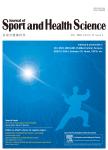Where are the limits of the effects of exercise intensity on cognitive control?
运动强度对认知控制的作用限制何在?(英文)作者机构:Aix Marseille UniversitCNRSLPC UMR 7290FR 3C FR 351213331 Marseille Cedex 3France Universit de Nice Sophia AntipolisUFR STAPSLAMHESS EA 630906205 Nice Cedex 3France
出 版 物:《Journal of Sport and Health Science》 (运动与健康科学(英文))
年 卷 期:2015年第4卷第1期
页 面:56-63页
核心收录:
学科分类:0402[教育学-心理学(可授教育学、理学学位)] 0403[教育学-体育学] 040203[教育学-应用心理学] 04[教育学] 1002[医学-临床医学] 1010[医学-医学技术(可授医学、理学学位)]
基 金:supported by a grant from the French Research Agency (ANR 2013-069)
主 题:Between-trials adjustments Intensity level Reaction time distributional Simon Task
摘 要:Purpose: This study aimed to investigate whether workload intensity modulates exercise-induced effect on reaction time (RT) performances, and more specifically to clarify whether cognitive control that plays a crucial role in rapid decision making is altered. Methods: Fourteen participants performed a Simon Task while cycling 20 min at a light (first ventilatory threshold, VT~ - 20%), moderate (VTI), or very hard (VTj + 20%) level of exercise. Results: After 15 min of cycling, RTs are faster than during the first 5 min of exercise. This benefit does not fluctuate with the intensity of exercise and enlarges as RT lengthens. Despite a numerical difference suggesting a greater facilitation during moderate exercise (-16 ms) than during a light exercise (-10 ms), the benefit is not statistically different. Interestingly, we did not observe any signs of worsening on RT or on accuracy during very hard exercise. Conclusion: Cognitive control is extremely robust and appears not to be affected by the intensity of exercise. The selective inhibition and the between-trials adjustments are effective from the beginning to the end of exercise, regardless of the workload output.



